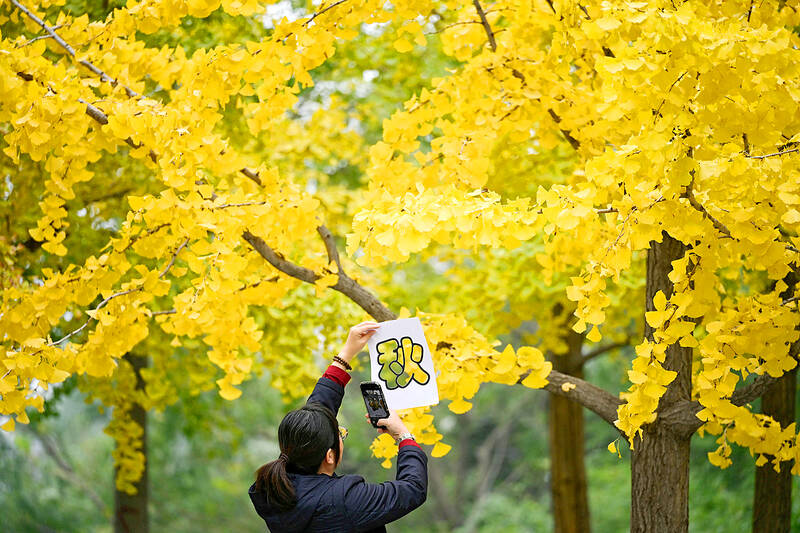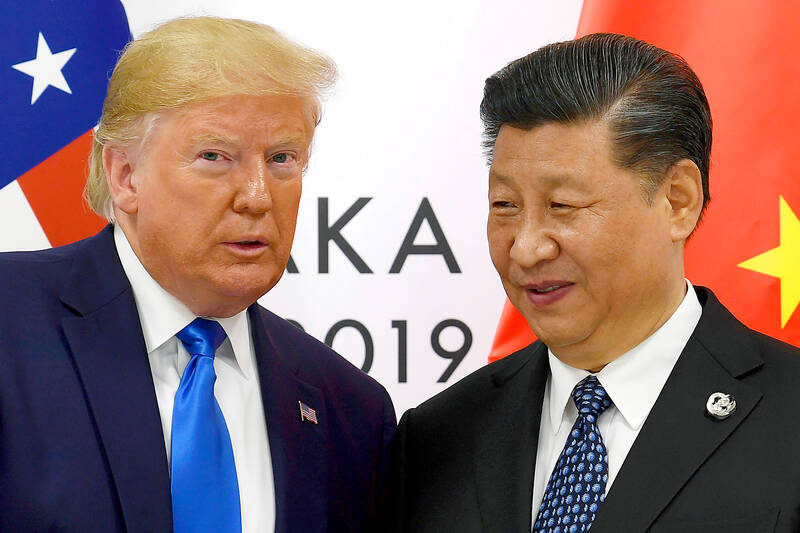Despite plummeting relations between Beijing and Washington, Shanghai resident Huang is determined that her daughter will complete her costly education in the US.
Even as the two sides have spent much of this year locked in a blistering trade row, US schools and universities remain hugely popular with parents who are chasing what they see as better opportunities and an international outlook for their children. They will be among many hoping an expected meeting between presidents Donald Trump and Xi Jinping (習近平) in South Korea today — their first encounter since the former’s return to the White House — could pave the way to stabilizing ties.
“Even though there’s a lot of drama going on right now... this is just temporary,” Huang said. “This is something I firmly believe in.”

Photo: AFP
Her 17-year-old daughter has been enrolled in high school in the US for three years and is hoping to study computer science at university there. Trump’s mercurial nature and his “America First” policies have spooked some of Huang’s friends, who are considering sending their children to Europe or Australia instead. But for Huang, the benefits of a US education far outweigh the cons.
“We feel that the United States is a country that can provide our child with more opportunities, and education is definitely more diverse,” said Huang, who did not give her full name due to privacy concerns.
There is a hefty price tag, though, with Huang estimating she currently pays more than US$100,000 a year in education and living expenses.

Photo: AFP
WEALTHIEST PARENTS ‘NOT WORRIED’
Young Chinese people have long been crucial to US universities’ balance sheets. After Indians, they made up the second-largest nationality of international students for the 2023-24 academic year, according to the Institute of International Education. But Trump has introduced policies aimed both at curbing immigration and weakening universities, which he sees as a power base of the left.

Photo: AP
Secretary of State Marco Rubio said in May that Washington would “aggressively revoke visas for Chinese students.” However, just a few months later, Trump said the country was going to allow 600,000 Chinese students to “come in.” The uncertainty doesn’t seem to have put off many Chinese parents, according to Godot Han, who works for a Beijing tutoring agency. Her wealthiest clients, especially, “have not been worried.”
They “won’t just read a single news article and then suddenly make changes” to long-held plans, she said. Teachers at her school, part of a thriving domestic industry, prepare some 200 Chinese students yearly for the tests needed for US university admission. A one-on-one session ranges from US$112 to US$210 an hour, with some students attending several a day.
Some parents worry for their children’s safety, because of school shootings in the US and the policies of the Trump administration.
But many have just always “had that kind of American dream,” Han said.
NEVER A ‘HONEYMOON PERIOD’
The enduring appeal of a US education rests on its “perceived quality and historical reputation,” said Dylan Loh from Singapore’s Nanyang Technological University.
“This reputation and prestige are longstanding and despite the obvious difficulties, still remain and will remain for a long time,” he said.
Another parent, Ping Jiaqi, said that US universities could help foster “independent thinking” in his 17-year-old daughter, who is studying at an international high school in China’s eastern Zhejiang province. She attended summer school at Brown University last year and visited several other campuses in the US, hoping to move there for university.
Her father expects her entire tertiary education will cost more than US$400,000. Ping, who runs an education consultancy for Chinese students hoping to study abroad, said daily life for his US-based friends and students “hasn’t been affected much” by Trump.
“When I think about it, US-China relations haven’t really been good at any point over the past decade,” he said.
“There was never really a honeymoon period.”

As I finally slid into the warm embrace of the hot, clifftop pool, it was a serene moment of reflection. The sound of the river reflected off the cave walls, the white of our camping lights reflected off the dark, shimmering surface of the water, and I reflected on how fortunate I was to be here. After all, the beautiful walk through narrow canyons that had brought us here had been inaccessible for five years — and will be again soon. The day had started at the Huisun Forest Area (惠蓀林場), at the end of Nantou County Route 80, north and east

Specialty sandwiches loaded with the contents of an entire charcuterie board, overflowing with sauces, creams and all manner of creative add-ons, is perhaps one of the biggest global food trends of this year. From London to New York, lines form down the block for mortadella, burrata, pistachio and more stuffed between slices of fresh sourdough, rye or focaccia. To try the trend in Taipei, Munchies Mafia is for sure the spot — could this be the best sandwich in town? Carlos from Spain and Sergio from Mexico opened this spot just seven months ago. The two met working in the

Exceptions to the rule are sometimes revealing. For a brief few years, there was an emerging ideological split between the Democratic Progressive Party (DPP) and Chinese Nationalist Party (KMT) that appeared to be pushing the DPP in a direction that would be considered more liberal, and the KMT more conservative. In the previous column, “The KMT-DPP’s bureaucrat-led developmental state” (Dec. 11, page 12), we examined how Taiwan’s democratic system developed, and how both the two main parties largely accepted a similar consensus on how Taiwan should be run domestically and did not split along the left-right lines more familiar in

A six-episode, behind-the-scenes Disney+ docuseries about Taylor Swift’s Eras Tour and Rian Johnson’s third Knives Out movie, Wake Up Dead Man, are some of the new television, films, music and games headed to a device near you. Also among the streaming offerings worth your time this week: Chip and Joanna Gaines take on a big job revamping a small home in the mountains of Colorado, video gamers can skateboard through hell in Sam Eng’s Skate Story and Rob Reiner gets the band back together for Spinal Tap II: The End Continues. MOVIES ■ Rian Johnson’s third Knives Out movie, Wake Up Dead Man